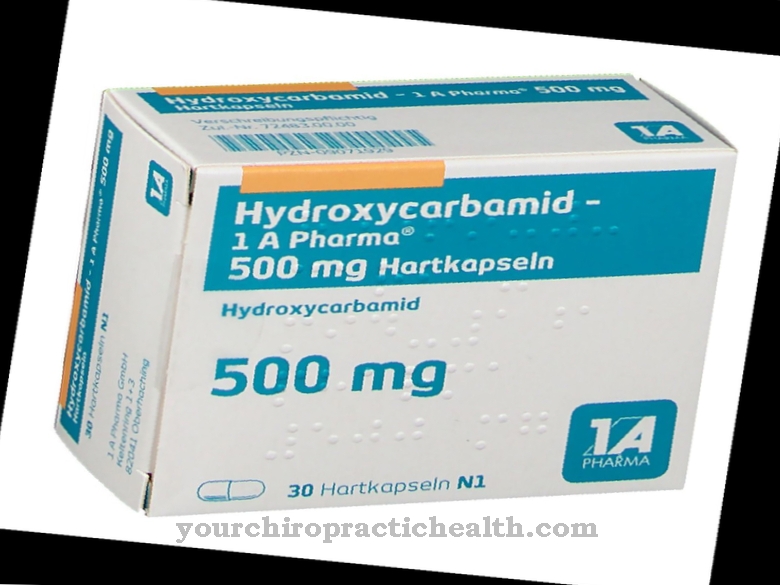Sodium hydrogen carbonate is a sodium salt and belongs to the hydrogen carbonates. Colloquially, the material is also called Baking soda known.
What is sodium hydrogen carbonate?

Sodium hydrogen carbonate has the empirical formula NaHCO3. The substance is a sodium salt of carbonic acid, which belongs to the group of hydrogen carbonates. Hydrogen carbonates, formerly also known as bicarbonates, are salts of carbonic acid that are formed by neutralizing the acid with a base. Hydrogen carbonates have a solid physical state. Ionic bonds exist between the hydrogen carbonate ions and the cations, which ensure a firm bond.
Sodium hydrogen carbonate is usually colorless, but it appears white in the powder form. The substance is odorless and can be dissolved in water. Sodium hydrogen carbonate decays at a temperature above 50 ° Celsius. This creates water and carbon dioxide, among other things.
In the United States, sodium hydrogen carbonate comes as a natural mineral Nahcolith in front. It is found finely distributed in oil shale and can therefore be obtained as a by-product in the extraction of oil. Sodium hydrogen carbonate can also be produced synthetically. For this purpose, purified sodium carbonate solution is reacted with carbon dioxide. Sodium hydrogen carbonate is then obtained by filtration. This must be dried very carefully so that it does not dissolve again.
Sodium hydrogen carbonate is also produced in the Solvay process (also known as the ammonia-soda process). The resulting sodium hydrogen carbonate is contaminated with ammonium chloride and is therefore usually not used.
Pharmacological effect
In the past, sodium hydrogen carbonate was widely used to treat conditions with high levels of acid in the stomach. Sodium hydrogen carbonate increases the intragastric pH. The pH value in the stomach rises to over 7 within a short period of time. This is due to the fact that sodium hydrogen carbonate can bind gastric acid. However, sodium hydrogen carbonate not only binds acids in the stomach, but throughout the body.
Medical application & use
Due to its acid-binding properties, sodium hydrogen carbonate is used in various diseases. In the past, sodium hydrogen carbonate was often used as an antacid to treat heartburn. Although the treatment is now considered out of date, many products for heartburn and stomach problems still contain sodium bicarbonate. The well-known Bullrich salt, for example, consists of 100 percent sodium hydrogen carbonate.
Sodium hydrogen carbonate not only acts as a buffer in the stomach, but also in the blood. For example, it is used as a buffer substance to compensate for the missing bases in hemodialysis. During hemodialysis, fluid and dissolved molecules are removed from the circulating blood via filter systems outside the body. A dialyzer is used for this. Dialyses are mainly used for kidney disease. However, this can lead to hyperacidity, known as metabolic acidosis.Sodium hydrogen carbonate is used to correct acidosis.
In bicarbonate dialysis, the substance is added to the dialysate. The advantage over other agents against acidosis, such as acetate or lactate, is that sodium hydrogen carbonate does not have to be metabolized in order to develop its full effect. That is why sodium hydrogen carbonate is one of the buffer substances that is most frequently used in hemodialysis worldwide. If hemodialysis is accompanied by sodium hydrogen carbonate, there are significantly fewer drops in blood pressure, cramps, nausea and vomiting.
Sodium hydrogen carbonate is not only used in hemodialysis, but generally in the treatment of metabolic acidosis. Metabolic acidosis is a term for a metabolic acidification of the blood and the body. Causes are an increased proton attack, a reduced excretion of protons or a loss of bicarbonates. Metabolic acidosis can develop in the case of a diabetic metabolic imbalance, poisoning with acidic substances, severe diarrhea or chronic kidney failure.
Sodium hydrogen carbonate is also used for hyperkalemia. Hyperkalemia has too much potassium in the blood. The life-threatening electrolyte disorder can be triggered by kidney disease, various medications or serious muscle injuries. Typical symptoms are abnormal sensations, muscle twitching and cardiac arrhythmias. However, cardiovascular arrest is often the first, only and usually fatal symptom.
In the United States, many toothpastes contain sodium hydrogen carbonate. There the substance is wrongly ascribed an abrasive effect. Abrasives are abrasives. In dental care, these substances are supposed to remove plaque from the teeth and thus make the teeth whiter.
Risks & side effects
When sodium hydrogen carbonate is used to treat heartburn, it can make symptoms worse. The rapid rise in pH in the stomach leads to an increased release of the hormone gastrin. Gastrin is the main stimulus for the production of stomach acid. After taking sodium hydrogen carbonate, there is a reactive increase in gastric acid production, so that after a while the stomach becomes even more acidic. In addition, when taking sodium hydrogen carbonate, CO2 develops in the stomach. Many patients find this very uncomfortable. Belching and gas are the consequences.
An overdose of sodium hydrogen carbonate can also lead to alkalosis. The pH of the blood rises by increasing the bicarbonate to a value of over 7.45. The intracellular hydrogen ions are then exchanged for extracellular potassium, so that hypokalaemia (a potassium deficiency) develops. Typical symptoms of a lowered potassium level in the blood are muscular adynamia with paralysis, reflex weakening or abolition of reflexes, constipation, bladder paralysis, intestinal obstruction and cardiac arrhythmias.
Rhabdomyolysis can also occur. The muscle fibers of the striated muscles break down. As a result, people suffer from muscle pain and weakness. In the worst case, the surge of muscle decay products in the kidney can cause acute kidney failure.



























